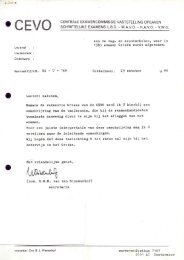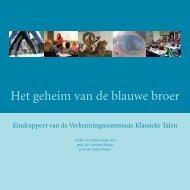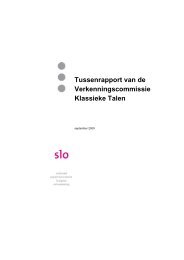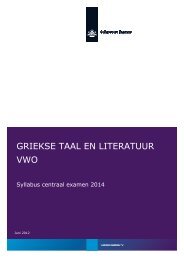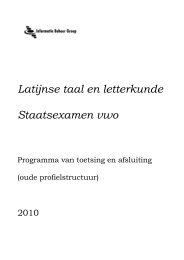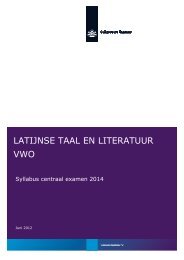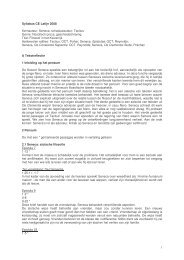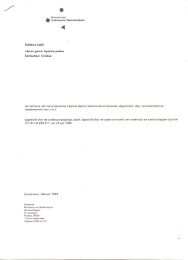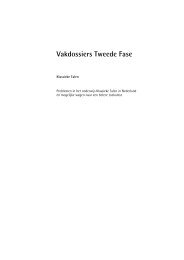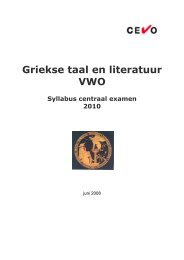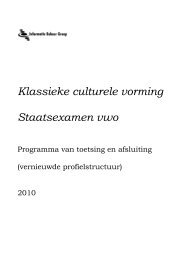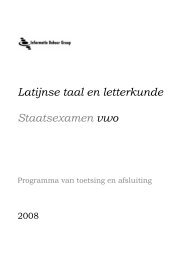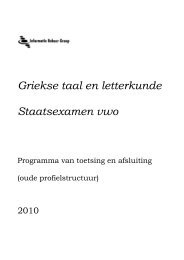Rome Wasn't Digitized in a Day - Council on Library and Information ...
Rome Wasn't Digitized in a Day - Council on Library and Information ...
Rome Wasn't Digitized in a Day - Council on Library and Information ...
Create successful ePaper yourself
Turn your PDF publications into a flip-book with our unique Google optimized e-Paper software.
62<br />
This manual analysis provided a classificati<strong>on</strong> of the different types of text variati<strong>on</strong>, <str<strong>on</strong>g>in</str<strong>on</strong>g>clud<str<strong>on</strong>g>in</str<strong>on</strong>g>g regular<br />
text differences, irregular text differences, word omissi<strong>on</strong>, text <str<strong>on</strong>g>in</str<strong>on</strong>g>serti<strong>on</strong>, <strong>and</strong> word substituti<strong>on</strong>. The<br />
algorithm that was ultimately developed has not yet been put <str<strong>on</strong>g>in</str<strong>on</strong>g>to the producti<strong>on</strong> PDL.<br />
Other research by Perseus has explored automatic citati<strong>on</strong> <strong>and</strong> quotati<strong>on</strong> identificati<strong>on</strong> by utiliz<str<strong>on</strong>g>in</str<strong>on</strong>g>g<br />
quotati<strong>on</strong> <str<strong>on</strong>g>in</str<strong>on</strong>g>dexes, or <str<strong>on</strong>g>in</str<strong>on</strong>g>dices scriptorum, which typically listed all of the authors quoted with<str<strong>on</strong>g>in</str<strong>on</strong>g> a<br />
classical text <strong>and</strong> were manually created by editors for critical editi<strong>on</strong>s of classical texts. Fuzzy pars<str<strong>on</strong>g>in</str<strong>on</strong>g>g<br />
techniques were applied to the OCR transcripti<strong>on</strong> of <strong>on</strong>e such <str<strong>on</strong>g>in</str<strong>on</strong>g>dex from the Deipnosophistae of<br />
Athenaeus to then automatically mark up all the quotati<strong>on</strong>s found with<str<strong>on</strong>g>in</str<strong>on</strong>g> the <str<strong>on</strong>g>in</str<strong>on</strong>g>dex <str<strong>on</strong>g>in</str<strong>on</strong>g> a digital versi<strong>on</strong><br />
of the text (Romanello et al. 2009c).<br />
THE DISCIPLINES AND TECHNOLOGIES OF DIGITAL CLASSICS<br />
This secti<strong>on</strong> explores a variety of subdiscipl<str<strong>on</strong>g>in</str<strong>on</strong>g>es or related discipl<str<strong>on</strong>g>in</str<strong>on</strong>g>es of digital classics <strong>and</strong> presents<br />
an overview of some important projects <strong>and</strong> relevant literature <str<strong>on</strong>g>in</str<strong>on</strong>g> each. These overviews are by no<br />
means exhaustive; the goal was to identify the major projects <str<strong>on</strong>g>in</str<strong>on</strong>g> each field that illustrate the key<br />
challenges faced.<br />
Ancient History<br />
In many ways the study of ancient history is less a subdiscipl<str<strong>on</strong>g>in</str<strong>on</strong>g>e of classical studies than an<br />
overarch<str<strong>on</strong>g>in</str<strong>on</strong>g>g field that makes use of all the sources that are studied <str<strong>on</strong>g>in</str<strong>on</strong>g>tensively <str<strong>on</strong>g>in</str<strong>on</strong>g> each of the other<br />
subdiscipl<str<strong>on</strong>g>in</str<strong>on</strong>g>es; c<strong>on</strong>sequently, various aspects of this topic are covered <str<strong>on</strong>g>in</str<strong>on</strong>g> many of the subdiscipl<str<strong>on</strong>g>in</str<strong>on</strong>g>e<br />
secti<strong>on</strong>s rather than <str<strong>on</strong>g>in</str<strong>on</strong>g> this secti<strong>on</strong> exclusively. The popularity of this topic is evidenced by<br />
<str<strong>on</strong>g>in</str<strong>on</strong>g>numerable academic <strong>and</strong> enthusiast websites <strong>on</strong> the history of Greece, <str<strong>on</strong>g>Rome</str<strong>on</strong>g>, <strong>and</strong> the Ancient Near<br />
East. One of the larger enthusiast websites is Attalus.org, 183 which provides detailed “lists of events<br />
<strong>and</strong> sources for the history of the Hellenistic world <strong>and</strong> the Roman republic” <strong>and</strong> <str<strong>on</strong>g>in</str<strong>on</strong>g>cludes translati<strong>on</strong>s<br />
of many of the relevant sources, such as Livy <strong>and</strong> Tacitus. The Livius 184 website, managed by Dutch<br />
historian J<strong>on</strong>a Lender<str<strong>on</strong>g>in</str<strong>on</strong>g>g, offers a search eng<str<strong>on</strong>g>in</str<strong>on</strong>g>e to a large number of <strong>on</strong>l<str<strong>on</strong>g>in</str<strong>on</strong>g>e articles <strong>on</strong> Roman <strong>and</strong><br />
Greek history.<br />
The subject of ancient history makes up a large comp<strong>on</strong>ent of many digital classics projects, albeit not<br />
necessarily as a specific focus; <str<strong>on</strong>g>in</str<strong>on</strong>g>stead, the sources provided (whether primary texts or documentary<br />
sources such as <str<strong>on</strong>g>in</str<strong>on</strong>g>scripti<strong>on</strong>s, papyri, or co<str<strong>on</strong>g>in</str<strong>on</strong>g>s) support the study of ancient history. As <strong>on</strong>e report<br />
recently noted, digital archives are provid<str<strong>on</strong>g>in</str<strong>on</strong>g>g access to all of these materials at a rapid rate:<br />
Scholars of ancient history study particular documentary rema<str<strong>on</strong>g>in</str<strong>on</strong>g>s (such as <str<strong>on</strong>g>in</str<strong>on</strong>g>scripti<strong>on</strong>s, papyri,<br />
ancient maps, classical literature <strong>and</strong> drama, <strong>and</strong> art <strong>and</strong> architecture) to exam<str<strong>on</strong>g>in</str<strong>on</strong>g>e early<br />
societies. These materials may be excavated from multiple archaeological sites, <strong>and</strong> are<br />
generally found <str<strong>on</strong>g>in</str<strong>on</strong>g> archives. While documentary editi<strong>on</strong>s have traditi<strong>on</strong>ally provided scholars<br />
with wider access to archival sources, the growth of digital archives is perceived as a great<br />
bo<strong>on</strong>. On the <strong>on</strong>e h<strong>and</strong>, digital archives are allow<str<strong>on</strong>g>in</str<strong>on</strong>g>g scholars to search, study, <strong>and</strong> make<br />
c<strong>on</strong>necti<strong>on</strong>s between more archival materials. On the other h<strong>and</strong>, different archival materials<br />
are be<str<strong>on</strong>g>in</str<strong>on</strong>g>g digitized at various rates, <strong>and</strong> look<str<strong>on</strong>g>in</str<strong>on</strong>g>g at a digital surrogate may not replace the value<br />
of see<str<strong>on</strong>g>in</str<strong>on</strong>g>g the physical artifact. The “next generati<strong>on</strong>” of digital archives, accord<str<strong>on</strong>g>in</str<strong>on</strong>g>g to some<br />
183 http://www.attalus.org/<br />
184 http://www.livius.org/



